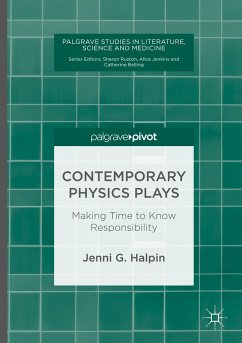This book analyzes recent physics plays, arguing that their enaction of concepts from the sciences they discuss alters the nature of the decisions made by the characters, changing the ethical judgements that might be cast on them. Recent physics plays regularly alter the shape of space-time itself, drawing together disparate moments, reversing the flow of time, creating apparent contradictions, and iterating scenes for multiple branches of counterfactual history. With these changes both causality and responsibility shift, variously. The roles of iconic scientists, such as Albert Einstein and Werner Heisenberg, are interrogated for their dramatic value, placing history and dramatic license in tension. Cold War strategies and the limits of espionage highlight the emphatically personal involvement of ordinary individuals. This study is vital reading for those interested in physics plays and the relationship between the sciences and the humanities.








